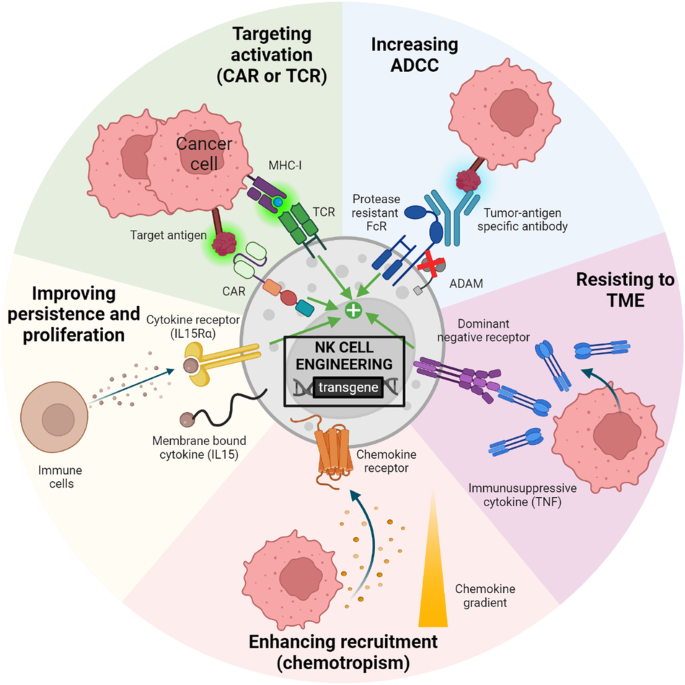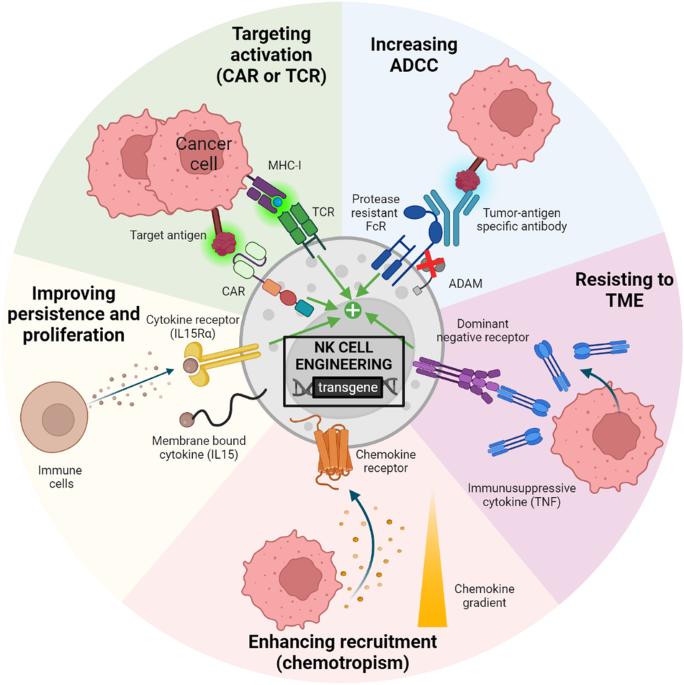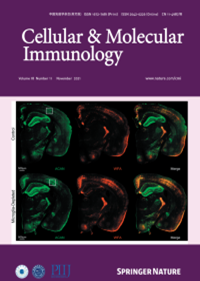通过受体工程开发基于 NK 细胞的癌症免疫疗法。
IF 21.8
1区 医学
Q1 IMMUNOLOGY
引用次数: 0
摘要
基于自然杀伤(NK)细胞的免疫疗法在癌症治疗领域正引起越来越多的关注。早期的临床试验显示了良好的结果,以及令人满意的产品疗效和安全性。最近的发展赋予了 NK 细胞更强的识别和细胞毒性能力,从而大大提高了它们的治疗潜力。大多数方法都是基于嵌合抗原受体工程,使 NK 细胞不受人类白细胞抗原的限制,靶向特定的肿瘤抗原。这种方法提高了 NK 介导的识别和消灭癌细胞的精确度和效力。此外,带有 T 细胞受体的 NK 细胞还能识别细胞内表位,从而扩大了靶肽的范围。通过优化免疫球蛋白常量片段受体的表达和信号传导,NK 细胞对肿瘤多肽的间接识别能力也得到了提高。事实上,经过改造的 NK 细胞具有更强的识别和摧毁涂有特异性抗体的靶细胞的能力,从而提高了其抗体依赖性细胞毒性。人们还探索了 NK 细胞受体工程在肿瘤微环境中促进转移细胞的扩增、持续存在和浸润的能力。此外,还讨论了基于受体的在肿瘤环境中维持 NK 细胞功能的策略,这些策略为对抗肿瘤诱导的免疫抑制提供了前景。随着技术挑战的解决,这些创新疗法很可能会重塑癌症免疫疗法。本文章由计算机程序翻译,如有差异,请以英文原文为准。


Development of NK cell-based cancer immunotherapies through receptor engineering
Natural killer (NK) cell-based immunotherapies are attracting increasing interest in the field of cancer treatment. Early clinical trials have shown promising outcomes, alongside satisfactory product efficacy and safety. Recent developments have greatly increased the therapeutic potential of NK cells by endowing them with enhanced recognition and cytotoxic capacities. This review focuses on surface receptor engineering in NK cell therapy and discusses its impact, challenges, and future directions. Most approaches are based on engineering with chimeric antigen receptors to allow NK cells to target specific tumor antigens independent of human leukocyte antigen restriction. This approach has increased the precision and potency of NK-mediated recognition and elimination of cancer cells. In addition, engineering NK cells with T-cell receptors also mediates the recognition of intracellular epitopes, which broadens the range of target peptides. Indirect tumor peptide recognition by NK cells has also been improved by optimizing immunoglobulin constant fragment receptor expression and signaling. Indeed, engineered NK cells have an improved ability to recognize and destroy target cells coated with specific antibodies, thereby increasing their antibody-dependent cellular cytotoxicity. The ability of NK cell receptor engineering to promote the expansion, persistence, and infiltration of transferred cells in the tumor microenvironment has also been explored. Receptor-based strategies for sustained NK cell functionality within the tumor environment have also been discussed, and these strategies providing perspectives to counteract tumor-induced immunosuppression. Overall, receptor engineering has led to significant advances in NK cell-based cancer immunotherapies. As technical challenges are addressed, these innovative treatments will likely reshape cancer immunotherapy.
求助全文
通过发布文献求助,成功后即可免费获取论文全文。
去求助
来源期刊
CiteScore
31.20
自引率
1.20%
发文量
903
审稿时长
1 months
期刊介绍:
Cellular & Molecular Immunology, a monthly journal from the Chinese Society of Immunology and the University of Science and Technology of China, serves as a comprehensive platform covering both basic immunology research and clinical applications. The journal publishes a variety of article types, including Articles, Review Articles, Mini Reviews, and Short Communications, focusing on diverse aspects of cellular and molecular immunology.

 求助内容:
求助内容: 应助结果提醒方式:
应助结果提醒方式:


